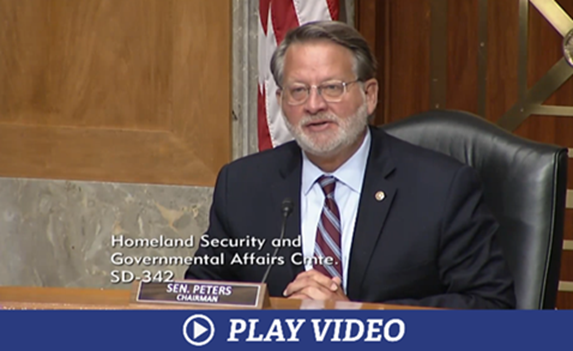VIDEO: Peters Convenes Hearing on Protecting Communities from Unmanned Aircraft Systems
WASHINGTON, D.C. – U.S. Senator Gary Peters (D-MI), Chairman of the Homeland Security and Governmental Affairs Committee, convened a hearing with senior federal officials on the risk that unmanned aircraft systems (UAS), commonly known as drones, pose to communities across the country and how government agencies are working to combat this evolving threat. The hearing also discussed how lawmakers can work to ensure the Department of Homeland Security (DHS), the Department of Justice (DOJ), and the Federal Aviation Administration (FAA) have the necessary tools to effectively counter UAS – including by renewing and expanding the authorities provided by the Preventing Emerging Threats Act of 2018. Peters is currently working on legislation to reauthorize and strengthen this law that has bolstered our nation’s ability to protect against UAS threats.
“The increase in the number of UAS operating in our air space creates a higher risk of rogue drones either failing to obey safety rules, or operating with nefarious intentions, threatening manned aircraft operations, airports, critical infrastructure facilities, and high-profile, widely-attended events such as sporting events, concerts, and more,” said Peters during his opening remarks.
Peters continued: “And as we work to avoid unintentional disasters, we must also account for the escalating threat of weaponized drones from terrorist and criminal organizations who could launch domestic drone attacks on mass gatherings, high-profile landmarks and buildings, or federal property.”
To watch video of Senator Peters’ opening remarks, click here. For text of Peters’ opening remarks, as prepared, click here.
To watch video of Senator Peters’ questions, click here.
The commercial market for UAS is rapidly expanding due to the increased accessibility of these new technologies. The FAA estimates that by 2024 about 2.3 million UAS will be registered to fly in U.S. airspace. The increasing numbers of registered UAS create a higher risk of both unintentional disasters and malicious activity from foreign adversaries or criminal organizations that seek to weaponize drones or engage in illegal activities, such as the trafficking of illicit drugs across U.S. borders.
During the hearing, Peters asked the witnesses to further describe the threat posed by UAS and how attacks using these technologies can disrupt and damage critical infrastructure and essential service – including transportation systems. The hearing also discussed how federal agencies can coordinate with state and local law enforcement to counter UAS threats, while respecting civil rights and liberties. Finally, Peters and the witnesses emphasized the importance of renewing and expanding DHS and DOJ’s authorities to counter UAS, which are set to expire in October of this year.
###
